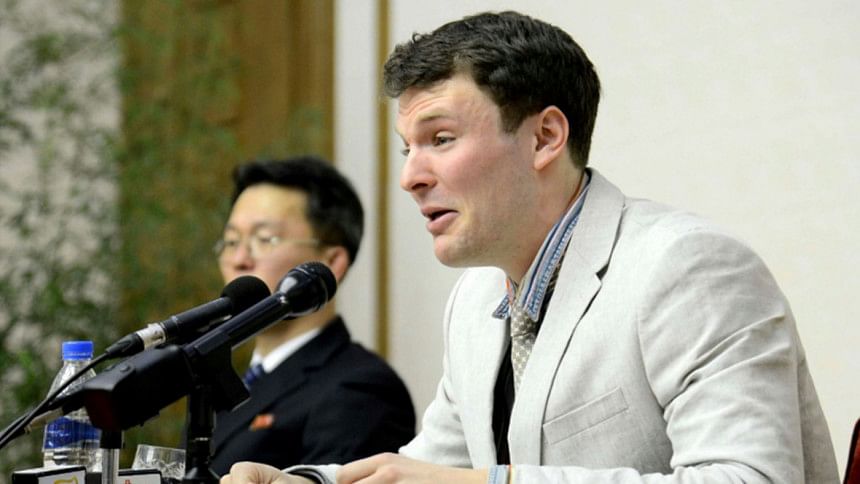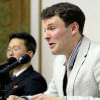US student dies after release from NKorea

Otto Warmbier, the US student released in a coma last week after nearly 18 months in detention in North Korea, died on Monday, prompting President Donald Trump to slam the "brutal regime" in Pyongyang.
The 22-year-old was medically evacuated to the United States last Tuesday, suffering from severe brain damage. He died six days later surrounded by relatives in his hometown of Cincinnati, Ohio.
"The awful torturous mistreatment our son received at the hands of the North Koreans ensured that no other outcome was possible," the family said in a statement announcing Warmbier's death.
The young man was on a tourist trip when he was arrested and sentenced in March last year to 15 years hard labor for stealing a political poster from a North Korean hotel, a punishment the United States decried as far out of proportion to his alleged crime.
Trump lashed out at Pyongyang following news of his death.
"It's a brutal regime," he said during a White House event. "Bad things happened but at least we got him home to his parents."
In a separate written statement, Trump said, "Otto's fate deepens my Administration's determination to prevent such tragedies from befalling innocent people at the hands of regimes that do not respect the rule of law or basic human decency."
"The United States once again condemns the brutality of the North Korean regime as we mourn its latest victim."
Added Secretary of State Rex Tillerson: "We hold North Korea accountable for Otto Warmbier's unjust imprisonment, and demand the release of three other Americans who have been illegally detained."
'At peace'
Doctors last week revealed that Warmbier had suffered severe neurological injuries, and described him as being in a state of "unresponsive wakefulness," opening his eyes and blinking, but showing no signs of understanding language or of being aware of his surroundings.
His family said Monday that he first appeared anguished when he first arrived home, but died "at peace."
Kim Jong-Un's regime claimed Warmbier fell into a coma soon after he was sentenced last year, saying the college student had contracted botulism and been given a sleeping pill.
Medical tests carried out last week in the United States offered no conclusive evidence as to the cause of his neurological injuries, and no evidence of a prior botulism infection. Warmbier's doctors said he had suffered extensive tissue loss in all regions of his brain, but showed no signs of physical trauma.
They said that given his young age, Warmbier's severe brain injury was most likely caused by cardiopulmonary arrest cutting the blood supply to the brain.
'No excuse'
Warmbier's release came amid mounting tensions with Washington following a series of missile tests by Pyongyang, focusing attention on an arms buildup that Pentagon chief Jim Mattis has dubbed "a clear and present danger to all."
The young man's death also brought attention to North Korea's human rights record. A Washington-based rights group tied Warmbier's fate to many others "starved, tortured, brutalized and killed in North Korea's political prison camps."
"Millions of unknown North Koreans are subjected to the brutality of the Kim regime," the Committee for Human Rights in North Korea said in a statement.
Warmbier's father, Fred, lashed out at North Korea last week, telling a news conference, "there is no excuse for any civilized nation to have kept his condition secret and denied him top-notch medical care for so long."
In their statement Monday, Warmbier's family said they believed the young man had found a peace of sorts after being flown home.
"When Otto returned to Cincinnati late on June 13th he was unable to speak, unable to see and unable to react to verbal commands. He looked very uncomfortable -- almost anguished," they said.
"Although we would never hear his voice again, within a day the countenance of his face changed -- he was at peace. He was home and we believe he could sense that," they added.
Three more US citizens are currently being held by North Korea. Two were teachers at a Pyongyang university funded by overseas Christian groups, and the third a Korean-American pastor who was accused of espionage for the South.
Following Warmbier's death, the tour group that arranged his trip to North Korea said it would no longer take Americans into the isolated country.
"The devastating loss of Otto Warmbier's life has led us to reconsider our position on accepting American tourists. There had not been any previous detainment in North Korea that has ended with such tragic finality and we have been struggling to process the result," China-based Young Pioneer Tours said in a statement.
"Now, the assessment of risk for Americans visiting North Korea has become too high. The way his detention was handled was appalling, and a tragedy like this must never be repeated," it said.

 For all latest news, follow The Daily Star's Google News channel.
For all latest news, follow The Daily Star's Google News channel. 






Comments